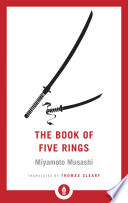

The Book of Five Rings, written by the legendary swordsman Miyamoto Musashi, serves as a guide to strategy, philosophy, and personal development. Musashi, through his experiences in dueling and martial arts, distills his...
Continue readingMiyamoto Musashi emphasizes that strategy is crucial not only in combat but in all aspects of life. He outlines the need for a clear understanding of one’s goals and the environment in which one operates. By having a wel...
Continue readingMusashi discusses the mindset required to be a warrior, which includes discipline, focus, and the ability to remain calm under pressure. He argues that cultivating a warrior's mindset is essential for overcoming obstacle...
Continue readingTiming is a recurring theme in Musashi's teachings. He stresses that understanding the right moment to act is vital in both combat and life. This idea extends beyond mere moments; it encompasses the timing of decisions, ...
Continue readingObservation is a key skill that Musashi advocates for. He believes that keen observation allows individuals to gather information and insights that can inform their strategies and actions. By observing others and the env...
Continue readingMusashi highlights the importance of balancing technique with intuition. While techniques and skills are essential for success, relying solely on them can lead to rigidity. Musashi argues that intuition, developed throug...
Continue readingDiscipline and rigorous training are central to Musashi’s philosophy. He believes that mastery in any field requires a commitment to consistent practice and self-discipline. Musashi outlines various training methods that...
Continue readingMusashi discusses the idea that everything is interconnected, and understanding these connections can enhance one’s effectiveness. This concept encourages individuals to see the bigger picture and recognize how their act...
Continue readingThe reading time for The Book of Five Rings depends on the reader's pace. However, this concise book summary covers the 7 key ideas from The Book of Five Rings, allowing you to quickly understand the main concepts, insights, and practical applications in around 20 min.
The Book of Five Rings is definitely worth reading. The book covers essential topics including The Importance of Strategy, The Mindset of a Warrior, The Concept of Timing, providing practical insights and actionable advice. Whether you read the full book or our concise summary, The Book of Five Rings delivers valuable knowledge that can help you improve your understanding and apply these concepts in your personal or professional life.
The Book of Five Rings was written by Miyamoto Musashi.
If you enjoyed The Book of Five Rings by Miyamoto Musashi and want to explore similar topics or deepen your understanding, we highly recommend these related book summaries:
These books cover related themes, complementary concepts, and will help you build upon the knowledge gained from The Book of Five Rings. Each of these summaries provides concise insights that can further enhance your understanding and practical application of the ideas presented in The Book of Five Rings.